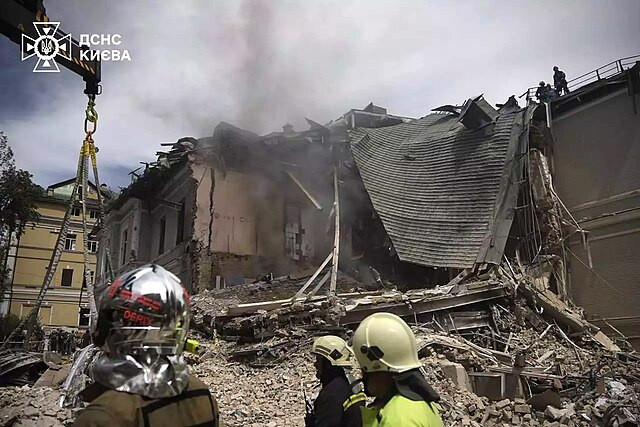Russia unleashed a barrage of missile and drone strikes across Ukraine on Monday and Tuesday, resulting in the deaths of at least five people and extensive damage to critical infrastructure. This latest offensive marks one of the most severe attacks since the onset of the war, with Moscow targeting both military and civilian sites across the country.
In the central city of Kryvyi Rih, a missile strike obliterated a hotel, killing two people, according to regional officials. Another three fatalities occurred in drone attacks on the southeastern city of Zaporizhzhia. "The hotel was completely wiped out," Serhiy Lisak, the governor of the Dnipropetrovsk region, reported on Telegram. The attack also left five people injured and raised concerns that two civilians might still be trapped under the hotel rubble.
The assault on Ukraine's energy infrastructure was particularly devastating, as over 200 missiles and drones struck various targets. President Volodymyr Zelenskyy condemned the attacks as "vile" and called for international support, particularly in the form of advanced air defense systems and long-range weapons. "We are ready to push back if something like this happens again," Zelenskyy asserted, emphasizing the need for stronger defensive capabilities.
The Ukrainian air force managed to intercept a significant number of incoming threats, including five out of ten missiles and 60 out of 81 drones. However, ten drones remain unaccounted for, with one reportedly crossing into Belarusian territory. The persistent barrage highlights the ongoing challenges facing Ukraine's defense systems.
The Russian Defense Ministry, on the other hand, described the attacks as high-precision strikes targeting Ukraine's military-industrial complex. According to Interfax, the ministry denied any deliberate targeting of civilians. Despite these claims, the reality on the ground paints a different picture, with substantial civilian casualties and infrastructure damage.
This latest escalation follows a high-profile Ukrainian incursion into Russia's Kursk region, which has been described by some Russian military bloggers as a triggering factor for the intensified attacks. The Kursk region has been a focal point of recent conflicts, with concerns growing over the safety of the nearby nuclear power plant.
In the aftermath of the attacks, Ukraine has faced widespread power outages and infrastructure damage. Prime Minister Denys Shmyhal reported that the barrage affected 15 regions, prompting emergency power cuts to stabilize the grid. "The energy infrastructure has once again become the target of Russian terrorists," Shmyhal said, calling for increased support from Ukraine's allies to counter the ongoing threat.
The U.S. has responded by prioritizing the delivery of air defense systems and energy equipment to Ukraine. President Joe Biden labeled the attacks on energy infrastructure as "outrageous" and underscored the urgency of bolstering Ukraine's resilience against such strikes. "We are surging energy equipment to Ukraine to repair its systems and strengthen the resilience of Ukraine's energy grid," Biden stated.
In a related development, Poland and NATO activated their air defenses in response to heightened threats following the Russian attacks. Meanwhile, in Russia, officials reported that Ukrainian drones had targeted residential areas in Saratov and Engels, injuring four people. The Russian Defense Ministry claimed to have intercepted 22 Ukrainian drones over several provinces.





